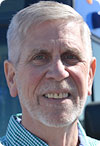
Born and raised on St. Paul’s East Side, Bob Benson joined the Navy, returned to his hometown and started a job proofing, baking and wrapping at Taystee Bread’s manufacturing plant. At the suggestion of a friend, he traded that job for one as a bus operator. While he wasn’t convinced he had the right personality for the job, Benson grew to love the work – so much so, in fact, that he built a 43-year career in transit.
Benson’s career began in 1976 at the old Snelling Garage, where he found himself driving some of the same routes he used to travel on growing up. Shy at first, Benson gradually started to open up to regular customers, a group of whom once invited him to a holiday party. “I was really awed by the whole aspect,” Benson said of his early days as an operator. “It really helped me learn how to talk to people and get away from my shyness.”
After five years at old Snelling, Benson was drawn to Bloomington’s South Garage, where he could get better hours. The move put him in unfamiliar territory, but it didn’t take long for Benson to learn his way around. “Minneapolis wasn’t as scary as I thought it would be,” he said. While he got more comfortable on the road, Benson also enjoyed a growing sense of community at South Garage, where he spent 38 of his 43 working years. “It really became more of a family,” he said. In addition to friendships, it was at South that Benson met an operator who would later become his wife. (The relationship began when that operator, Lisa Benson, began rearranging the thumbtacks on Bob Benson’s carefully color-coordinated bulletin board.)
As Benson’s confidence grew, so too did his ambition. In 1987, he became a relief instructor and began sharing some of the lessons he learned with newly hired operators. Benson also started filling in as garage coordinator, and in late 1994 took on that role full-time. As coordinator, Benson organized operator training, created standard protocols and served as a resource for operators, maintenance staff and service planners. He also made a point of passing the familial feeling he enjoyed onto new operators, learning their names and leaving his office door open so people could come to him with questions or to seek advice. “I always wanted to be the light in the dark hallway,” he said. “Once I could see that I could make improvements and help people, I knew this was the job for me.”
His responsibilities as coordinator grew over time, too. Benson was involved in large projects like the opening of the Marq2 corridor, the I-35W & 46th Street Station and Metro Transit’s first Bus Rapid Transit service, the A Line. He also experienced two World Series, two Super Bowls and 43 Minnesota State Fairs. Throughout it all, he continued to drive when other operators weren’t available. “It got to the point where there wasn’t enough time in the day to get everything done,” Benson said. “Being able to get involved in all these things was really gratifying.” When he retired, Benson had the longest tenure as coordinator among those holding the same position.
Benson retired on March 22, 2019 – exactly 43 years after his first day on the job. In retirement, he planned to devote more time to community service, volunteering with the Minnesota Zoo and as an election judge, traveling and golfing. He also looked forward to spending more time with family, including his three children and four grandchildren. “I came here thinking of this as a transitional job,” Benson said. “I think I missed my departure date by about 40 years.”